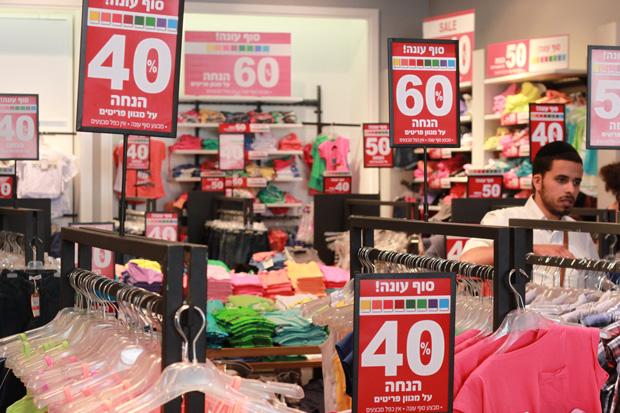Shopping Mall at Center of Culture War in Israel
Big sales at this clothes store in Ramot (Photo: Daniel Estrin)
One of the biggest conflicts in Israel doesn’t involve the Palestinians.
It’s over a shopping mall in a Jerusalem suburb of Ramot that’s at the center of a culture war.
The saga started even before the mall was built.
If the stories are to be believed, a powerful lobby of ultra-Orthodox Jews in city hall did not want a mall in a suburb where more and more ultra-Orthodox Jews were moving. So, they secreted away the developer’s plans in a drawer.
“It’s hard to believe,” says Zeev Lendner, who heads Ramot’s community council. “We had to look for them to find it. They were looking. Where can it be? Someone thought, maybe in his office, and he found it.”
He means the office of an ultra-Orthodox Jewish city council member.
The proposal was finally approved, but under one condition, Lendner says: Mall developers had to scrap plans to include a movie theater.
Ultra-Orthodox Jews typically don’t go to the movies.
Then, after the mall was built two years ago, ultra-Orthodox Jewish rabbis in the suburb made other requests, like asking shopkeepers to dress in modest clothing. Then a month ago, the rabbis said shopkeepers were ignoring their requests.
So, they called on their community to boycott the mall, which is now is nearly empty. In store after store, merchants say their sales are down as much as 50 percent.
Some stores have made changes. One clothing store manager said she removed all the posters featuring models, turned down the pop music, and even dressed her mannequins in long sleeved shirts and long skirts. Despite these gestures, the boycott of the mall continues.
This saleswoman at Fox, Israel’s version of the Gap store, is enraged.
“The ultra-Orthodox want us to be like Geula,” she says, referring to one of the most cloistered of Jerusalem’s ultra-Orthodox neighborhoods.
“It won’t happen,” she says. “The mall will not give in.”
Those boycotting the mall aren’t so sure about that. Shay Horovitz is a representative of the ultra-Orthodox rabbis heading the boycott.
“It feels pretty offensive to come, you pay money, and do shopping in a place that doesn’t give honor to your values and way of living,” says Horovitz.
The mall is in talks with ultra-Orthodox rabbis in the suburb to come up with a solution. Horovitz says the mall will eventually give in — because it needs their business.
“Someone who opens a store is not opening a political movement,” Horovitz says. “Or to do a civil statement. The reason he opens a store is that he wants to earn money. If he wants us to come, should respect us. There’s no argument here, I mean there’s no fight.”
But there is a fight over Israel’s character. When Ramot was built in the 1970s, most of its residents were non-religious. Over time, many ultra-Orthodox Jews moved in — taking advantage of the suburb’s cheap housing. Things started getting tense.
Ultra Orthodox Jewish kids would throw stones at cars driving on the Sabbath. Kindergartens and schools started catering to the strictly religious community. Secular residents began fleeing. Today, by most estimates, Ramot is majority ultra-Orthodox. Shahar Ilan, a commentator and critic of the ultra-Orthodox community, says the story of Ramot is the story of Jerusalem.
“50 years ago there were four limited neighborhoods of Haredim in Jerusalem. Now about half of the Jewish city are Haredim,” he says.
Those Haredim, or ultra-Orthodox Jews, are only about 10 percent of Israel’s population today. But in 20 years, their numbers are expected to double. And Ilan says within 50 years, the ultra-Orthodox will be such a big minority that it will create a real challenge to Israeli unity.
“Yes, Ramot will be ultra-Orthodox and yes, the Ramot mall in the end will be ultra-Orthodox. That’s clear. The question is if we will learn from Ramot.”
To maintain the peace, he says, ultra-Orthodox should live in their own separate towns and neighborhoods — where they can take control of their own malls.
